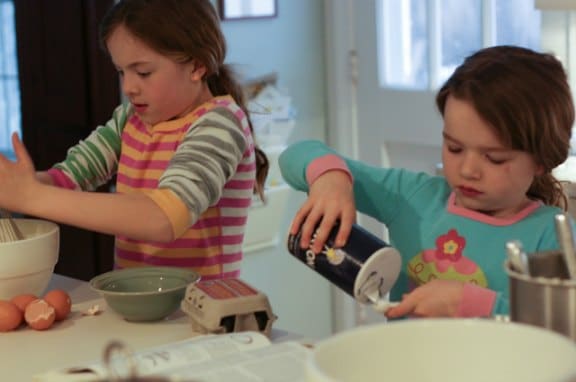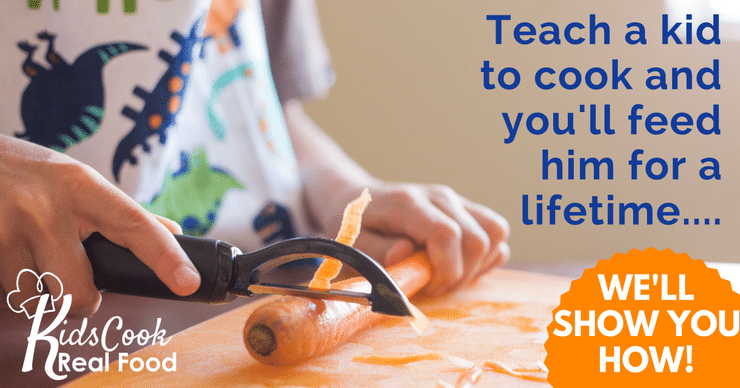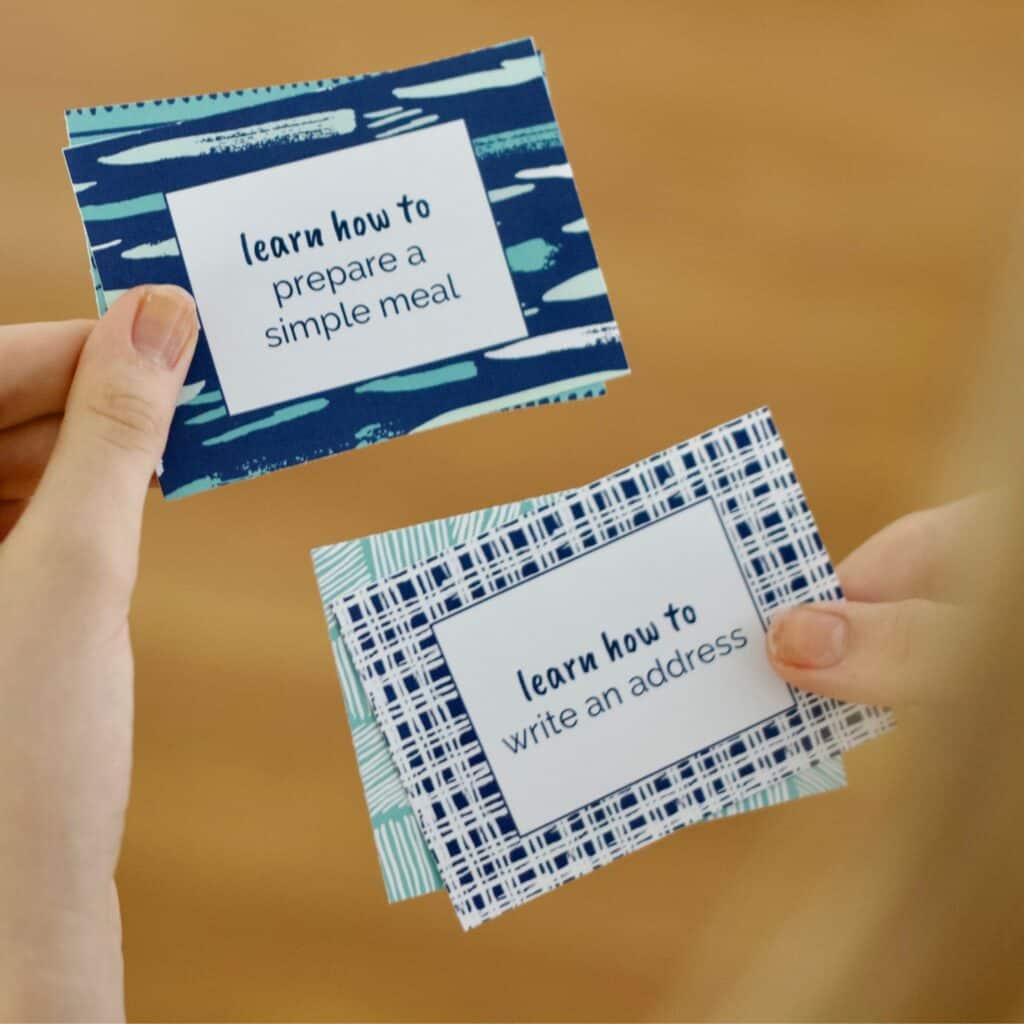Teach Kids to Cook by Age and Ability
Teaching kids to cook not only leads to healthier eating but also gives kids skills that could save them money as adults.

“Usually I just eat cereal or cook some eggs for dinner.” my friend admitted me.
“Huh?” I thought to myself.
“Or I pick up some Italian or Thai food down the street.”
Wow.
Here we were in our late 20s and all my friend knew how to cook were eggs. Nothing else, just eggs.
I couldn’t believe it.
As we kept talking it became obvious cooking was intimidating to my friend. She’d never been taught basic cooking techniques (other than teaching herself how to scramble eggs), her diet suffered for it (cereal for dinner?), and she was spending far more than she needed to on food.
That story stuck with me over the years as one of the reasons why I MUST teach my kids how to cook before they leave home.
Cooking has always been enjoyable for me – I love to try new recipes and test new foods. After a long day, cooking can be a creative outlet and provide a satisfying feeling of accomplishment. Plus, it’s a great way to bring friends and family together.
But even if you’re like me and love to cook, you might be wondering how exactly to pass on your knowledge to your kids. Here are a few suggestions on how to get kids comfortable in the kitchen and teach them the basic skills they need to grow into confident cooks.
First step: getting young kids to feel comfortable in the kitchen
Kids as young as 18 months can begin to help (or more like “help”) parents in the kitchen. Even if a toddler isn’t ready to do actual measuring and mixing – let him take part in some sensory play with flour or even a salt shaker to introduce him to what happens in the kitchen.
As they get older, preschoolers can begin to take on tasks that actually contribute to a final meal preparation. Some of these tasks include:
- Stirring batter in a bowl
- Rinsing fruits and vegetables
- Cutting soft fruits and vegetables
- Mixing and kneading yeast dough
- Rolling bread or pie dough
- Using cookie and biscuit cutters
- Whisking pancake batter
- Measuring and pouring liquid & dry ingredients
- Spreading butter on bread
- Mashing potatoes and other cooked vegetables
Source: Williams Sonoma
It’s also helpful to supply kids with the right tools – perfect for small hands and nothing too sharp – that will let them get more practice in the kitchen.
For a list of kitchen tools created specifically for young kids see: 11 Tools That Turn Kids Into Confident Kitchen Helpers

Next step: building confidence in the kitchen
Once kids are a little older – around 6-8 years old – they can begin to take on more responsibility, put together a few basic meals on their own, and start following simple recipes.
One of the first meals my girls made was eggs in a basket – after cutting a circle from a piece of bread with a cookie cutter, they heated up butter in a frying pan, toasted the bread in the butter, and then cooked a cracked egg in the hole of the bread. It’s become a favorite breakfast for them and taught them a few basics such as how to crack an egg, and how to safely use a stove.
Some other tasks kids at this age can take on include:
- Making toast
- Cooking grilled cheese
- Cooking eggs – scrambled, fried, and hard/soft boiled
- Using the microwave to heat up food
- Making mac and cheese from a box
- Putting together a simple salad
- Mixing together a variety of smoothies
To see a full list of cooking skills kids can take on by age – including pre-teens and teens – click on the image below. You’ll also be signed up for my weekly-ish newsletter about how to raise strong, independent kids:
Finally: teach kids the skills they need to cook independently
Warming kids up to being competent in the kitchen is a great start to raising kids who cook, but what they’ll eventually need are real cooking skills.
If you’re like me and have been cooking for years, you probably take your cooking skills for granted – How to safely use a knife, the best way to measure, and how use the stove without getting burned.
Knowing exactly what I need to teach my girls about cooking and the best way to explain it to them was not something I instinctively knew how to do.
Sure I could have spent time researching what I needed to teach them, but I was grateful to discover a step-by-step online cooking course that does all the work for me.
Kids Cook Real Food contains 8 self-paced courses separated by ages and ability. The beginners group is recommended for ages 2-6 or those kids who have no experience in the kitchen, intermediate courses teach kids sharp knives and stovetop safety, and the advanced level gets kids comfortable using small appliances and making more advanced dishes (like bechamel sauce).
Because the course is self-paced, kids can skip around if they’ve already learned how to crack an egg, for example, or simply aren’t interested in cooking beans.
I can’t say enough good things about this course. Katie Kimball, the creator of the course and a former teacher, presents information in a way that is fun and understandable for kids. She uses fun phrases such as “up and over soldier” to describe to kids how their fingers should look while slicing food. These sayings stick with the kids as a quick reminder of what they’ve been taught.
In addition to the classes, students also have access to 34 easy-to-make recipes used in the course, flashcards that provide a quick reminder of what kids learned in each class, and an activity packet.
To find out more about Kids Cook Real Food, and sign-up for the next available class, click on the link below:
Raising independent chefs
My girls have been learning to cook for a few months now and guess what? Last weekend, they made us dinner on their own!
Using the skills they’ve learned in the Kids Cook Real Food course, my youngest made whole wheat tortillas from scratch while my oldest cooked a chickpea wrap filling. As they scurried around our kitchen preparing the meal, I sat off to the side and answered questions about where to find ingredients and how best to roll dough into a circle.
About an hour later, the meal was finished and we all sat down to eat. The girls were filled with pride as we dug in and enjoyed our meal. And I breathed a sigh of relief knowing they’ll have at least one other option to cereal for dinner when they’re on their own.
Ready to teach your child life skills? These cards can help! Each card in this eighty-one deck contains a skill your child can begin practicing with you or on their own. Click here or the image below to learn more.
If you enjoyed this, you’ll also like:
11 Healthy and Easy Dinner Ideas for Kids and Teens – No Complicated Recipes Required!
15 Life Skills Kids Need Before They Leave Home
11 Tools That Turn Kids Into Confident Kitchen Helpers
9 Ways to Encourage Self-Sufficiency in Young Kids
What to do next…
1. Subscribe to Self-Sufficient Kids’ email list.
Like what you read here and want to learn more? Every Thursday I’ll send you one parenting tip about raising self-sufficient kids and creating the peaceful relationship you yearn to have with your child. Click here to sign up.
2. Take one of my quizzes!
Find out if you’re raising a self-sufficient kid (click here) or if you’re doing too much for your kids (click here). At the end of each quiz, you’ll be asked to provide your email address to see the results.
3. Get your kids started on chores.
Learn how to get your child started on chores (& keep them motivated + avoid power struggles) by enrolling in my Get Your Kids Successfully Started on Chores course. Click here to learn more and sign up.

About Kerry Flatley
Hi! I’m Kerry, the mother of two girls and a certified parent educator. I believe it is possible for parents to have a supportive, loving, and warm relationship with their kids while raising them to be independent and ultimately self-sufficient. Over the years, I’ve read numerous books and articles that support this belief and I’ve put these ideas into practice with my own kids. Read more about me and Self-Sufficient Kids here.



